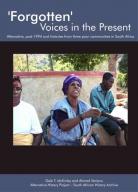Chris Nangalembe, member of the ANC, as well as the Sebokeng Crime Prevention Unit, was a bulwark of his local community. His efforts to eliminate crime in the township, including local gang ‘5-Star', ultimately led to his death. Later hearings of the Truth and Reconciliation Commission have confirmed that Nangalembe was kidnapped by unknown assailants and brutally murdered by strangulation on the night of the 5th of January, 1991. His body was abandoned and later found at a rubbish dump in the nearby township of Boipatong.
The dangers of remembering...
News of Nangalembe's death sent shock waves throughout Sebokeng. The community responded a week later on the 12th of January, 1991, with an all-night vigil held in a tent in Sebokeng, where weeping mourners paid final respects to their comrade and community leader.
The sudden invasion by a gang of armed men must have seemed surreal for the dozens of people crammed in and around the overflowing tent. Suddenly, a hand grenade was thrown, and as it went off the aggressors began to shoot randomly into the crowd. Thirty eight mourners lost their lives that night, and over forty were injured.
A brutal heritage
The indiscriminate nature of this attack has underscored the endemic brutality of the interregnum. This has been attributed to the lawlessness that reigned during these years, particularly as the discipline and vision of the struggle movement dissipated in the process of negotiations.
The Nangalembe Night Vigil Massacre heralded an undefined and unresolved period of brutal attacks against the Sebokeng community. Sebokeng exploded again on the 23rd of May, 1991, when two AK-47 clad men killed five of the nearly one hundred patrons of the Gobies Entwana Korporasie Beer Hall in Sebokeng after opening fire into the crowd. Within days, the death toll had risen to thirteen.
Violence against civilians was not isolated to Sebokeng during these years. On the 3rd of July, 1991, the family of Ernest Sotso, a prominent member of the ANC in exile and Vaal civic leader, was murdered in their home in Boipatong. The Kwa-Madala Hostel in Boipatong gained notoriety in June, 1992, when IFP-aligned hostel dwellers perpetrated unceasing violence and intimidation in the township. On the 17th of June, 1992 forty six residents were killed in what later became known as the Boipatong Massacre.
According to Daniel Serame Masemola, a retired Sebokeng community member interviewed by Dale McKinley for SAHA's 'Forgotten' Voices in the Present, the lingering culture of violence today should be dealt with more strongly by the government. Masemola has argued that the current dispensation should "take those guns from these young boys as they have got no license...
"Why do they agree that they should have guns...why? Why don't they collect all these guns from these young boys?"
Another Sebokeng resident, Bafana Makhanya, recalls the violent nature of the staunchly cultural IFP in the early 1990s. Makhanya has argued that "in politics you should not be allowed to kill each other....
"Even the ANC was involved in some of the killings and destroyed 135 houses of the people but they were not blamed for that...what was hurting was that the black people were killing each other."
In memory of the Nangalembe mourners
In a bid to memorialize the Nangalembe Night Vigil Massacre, and to pay homage to those whose public display of grief drove their aggressors to shoot them down, the Sebokeng community has built a monument in Sebokeng's Zone 7 in their honour. The monument, inscribed with the names of all victims, was unveiled in 1996 by then-President Nelson Mandela on the 21st of March, South Africa's Human Rights Day.
More views of the residents of Sebokeng can be found in the 'Forgotten' Voices in the Present project report and in SAHA's 'Forgotten' Voices in the Present Collection available for consultation in the archives at SAHA.
More information on the role of violence during apartheid and the interregnum may be found within SAHA's Freedom of Information Programme (FOIP) Collection. The Steyn Report File (AL2878_A2.4.1.3.1.16.1) is particularly useful for information related to the commission of enquiry led by Judge Goldstone into public violence and intimidation.
Other sources on violence and intimidation include the Trauma Centre for Survivors of Violence and Torture, the Institute of the Healing of Memories and the Centre for the Study of Violence and Reconciliation.







